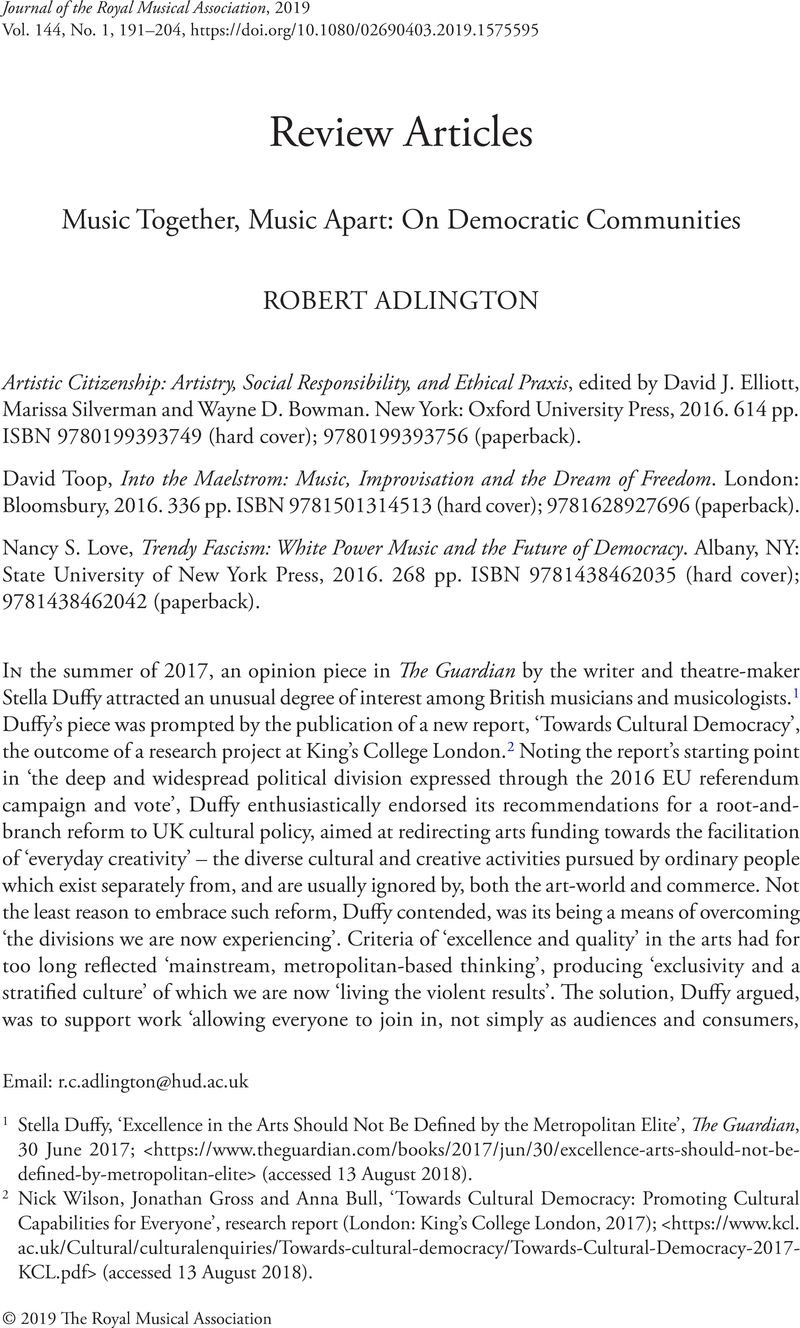Published online by Cambridge University Press: 01 January 2020

1 Stella Duffy, ‘Excellence in the Arts Should Not Be Defined by the Metropolitan Elite’, The Guardian, 30 June 2017; <https://www.theguardian.com/books/2017/jun/30/excellence-arts-should-not-be-defined-by-metropolitan-elite> (accessed 13 August 2018).
2 Nick Wilson, Jonathan Gross and Anna Bull, ‘Towards Cultural Democracy: Promoting Cultural Capabilities for Everyone’, research report (London: King's College London, 2017); <https://www.kcl.ac.uk/Cultural/culturalenquiries/Towards-cultural-democracy/Towards-Cultural-Democracy-2017-KCL.pdf> (accessed 13 August 2018).
3 Ian Pace, ‘Response to Stella Duffy on the Arts, Elitism, and Communities’, Desiring Progress blog (6 July 2017), <https://ianpace.wordpress.com/2017/07/06/response-to-stella-duffy-on-the-arts-elitism-and-communities> (accessed 13 August 2018). See also ‘Responses to Anna Bull (on Stella Duffy and “Everyday Creativity”)’, Desiring Progress blog (20 July 2017), <https://ianpace.wordpress.com/2017/07/20/responses-to-anna-bull-on-stella-duffy-and-everyday-creativity> (accessed 13 August 2018).
4 The comments quoted in this paragraph all come from responses to Duffy quoted in Pace, ‘Response to Stella Duffy’.
5 Anthony Gardner, Politically Unbecoming: Postsocialist Art against Democracy (Cambridge, MA: MIT Press, 2015).
6 Ibid., 5.
7 Audio recordings of Martin Stokes's IMR lectures may be streamed at <http://www.the-imr.uk/media> (accessed 13 August 2018).
8 Brazilian Popular Music and Citizenship, ed. Idelber Avelar and Christopher Dunn (Durham, NC: Duke University Press, 2011); Michael J. Kramer, The Republic of Rock: Music and Citizenship in the Sixties Counterculture (New York: Oxford University Press, 2013).
9 The size of the volume permits me only to scratch the surface of its contents in this review; my apologies to those contributors I have neglected.
10 See also Geoffrey Baker, El Sistema: Orchestrating Venezuela's Youth (New York: Oxford University Press, 2014).
11 Iris Marion Young, ‘The Ideal of Community and the Politics of Difference’, Social Theory and Practice, 12 (1986), 1–26 (pp. 1–2).
12 Thomas Turino, Music as Social Life: The Politics of Participation (Chicago, IL: University of Chicago Press, 2008). The new chapter expands upon material first elaborated in chapter 6 of this book.
13 Vujanović's case study is the state-subsidized contemporary art-world of the Netherlands in the 1970s and 80s; for a parallel argument with a closer focus on music, see the concluding chapter of my book Composing Dissent: Avant-garde Music in 1960s Amsterdam (New York: Oxford University Press, 2013).
14 Gardner, Politically Unbecoming, 32.
15 Toop's recurrent swipes at academia confirm one of free improvisation's abiding cultural aversions.
16 Cf. Benjamin Piekut, ‘Indeterminacy, Free Improvisation, and the Mixed Avant-Garde: Experimental Music in London, 1965–1975’, Journal of the American Musicological Society, 67 (2014), 769–824 (p. 807).
17 Here Toop follows Derek Bailey's separation of free improvisation from ‘idiomatic improvisation’; see Bailey, Improvisation: Its Nature and Practice in Music, 2nd edn ([New York]: Da Capo Press, 1992), xi.
18 On the aesthetic differences that sometimes separated male and female improvisers, see Julie Dawn Smith, ‘Playing Like a Girl: The Queer Laughter of the Feminist Improvising Group’, The Improvisation Studies Reader: Spontaneous Acts, ed. Ajay Heble and Rebecca Caines (London: Routledge, 2014), 261–77. Toop's polyphonic narrative is, however, certainly shaped by the opinions of many female informants.
19 For Edward Cone, for instance, the attentive listener, in contrast to composer and performer, ‘must submit to the direction of others’. Cone, The Composer's Voice (Berkeley, CA: University of California Press, 1974), 137.
20 The section where such infractions are recounted is entitled ‘Barging In’.
21 On this point, see Floris Schuiling, ‘The Instant Composers Pool: Music Notation and the Mediation of Improvising Agency’, Cadernos de arte e antropologia, 5/1 (2016), 39–58 (pp. 54–5).
22 Nancy S. Love, Musical Democracy (Albany, NY: State University of New York Press, 2006).
23 Progressive social movements are also the focus of her coedited volume Doing Democracy: Activist Art and Cultural Politics, ed. Nancy S. Love and Mark Mattern (Albany, NY: State University of New York Press, 2013). A recent colloquy on Trendy Fascism includes Love's thoughts on the first months of Trump's presidency plus a useful summary of the book's structure and aims; see Love, ‘Back to the Future: Trendy Fascism, the Trump Effect, and the Alt-Right’, New Political Science, 39 (2017), 263–8.
24 Kirsten Dyck, Reichsrock: The International Web of White-Power and Neo-Nazi Hate Music (New Brunswick, NJ: Rutgers University Press, 2016); Benjamin R. Teitelbaum, Lions of the North: Sounds of the New Nordic Radical Nationalism (New York: Oxford University Press, 2017). Earlier contributions include White Power Music: Scenes of Extreme-Right Cultural Resistance, ed. Anton Shekhovtsov and Paul Jackson (Ilford: Searchlight, 2012), and James Garratt, ‘Right-Extremist Protest Music and the Idea of Metapolitical Activism’, Protest Music in the Twentieth Century, ed. Roberto Illiano (Turnhout: Brepols, 2015), 19–42.
25 Cf. Teitelbaum's Lions of the North, which accords a significant place to the extreme nationalist Swedish Democrats party.
26 In reference to the USA, Cas Mudde has made a useful if not unproblematic distinction between the pro-democracy ‘radical right’ and the anti-democratic ‘extreme right’, both of which he encompasses within the term ‘far right’ and associates with white nationalism; see Mudde, The Far Right in America (London: Routledge, 2018), 1–2.
27 Jodi Dean, Žižek's Politics (London: Routledge, 2012), 122. This is the perspective that motivates Rancière's suspicion of (apparent) consensus.
28 Nancy S. Love and Mark Mattern, ‘Introduction: Art, Culture, Democracy’, Doing Democracy, ed. Love and Mattern, 3–28 (p. 10).
29 Frank Meeink, cited in Love, Trendy Fascism, 153.
30 Wilson, Gross and Bull, ‘Towards Cultural Democracy’, 22. Nussbaum's theory is advanced in her Creating Capabilities (Boston, MA: Harvard University Press, 2011).
31 Wilson, Gross and Bull, ‘Towards Cultural Democracy’, 22–3. Steven Hadley has usefully observed that a thorough assessment of the ‘Towards Cultural Democracy’ report would require fuller engagement with Nussbaum's ideas, which have not been without their critics; see Hadley's review of the report in Cultural Trends, 27 (2018), 52–5.
32 Wilson, Gross and Bull, ‘Towards Cultural Democracy’, 21, 24.